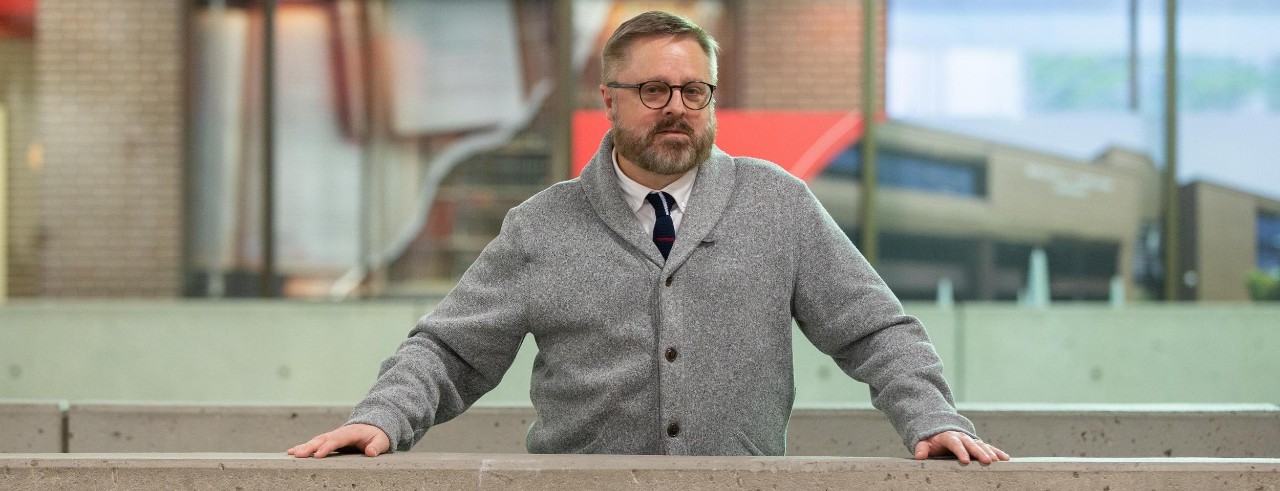
Local 12: How to spot misinformation about the Israel-Hamas war
UC professor says outrage can be a tool of manipulation
Misinformation about the war between Israel and Hamas is abundant online, but there are ways to avoid falling for fake news, a University of Cincinnati professor told Local 12.
Many people have turned to social media for real-time updates about the conflict in Israel and Palestine. However, people should maintain some skepticism about what they're seeing online, said Jeffrey Blevins, PhD, a professor in UC's Department of Journalism and School of Public and International Affairs.
“If you see something and you are outraged by it, instead of just leaning into that outrage, you should be skeptical,” Blevins said. “Is someone trying to persuade me, manipulate me, to believe something that is not necessarily true?”
To avoid falling for misinformation, look to accredited news institutions for accurate information. Big news and horrific stories likely will be reported on by multiple outlets, so be wary of stories from a single source. Reverse image searches also can help determine if photos are legitimate.
Also, be wary of information that purports to come from a legitimate news organization but in reality is disinformation.
“So one of these videos for instance, it looks like it comes from BBC, which of course is reputable news outlet,” Blevins said. “But essentially they just took BBC’s logo and put it on this video which falsely suggests, I mean it looks like a news report, but it is suggesting that Ukraine had provided the weaponry to Hamas to help pull off this attack in Israel.”
Featured image at top: Jeffrey Blevins, PhD, professor in UC's Department of Journalism and School of Public and International Affairs. Andrew Higley/UC Marketing + Brand
Impact Lives Here
The University of Cincinnati is leading public urban universities into a new era of innovation and impact. Our faculty, staff and students are saving lives, changing outcomes and bending the future in our city's direction. Next Lives Here.
Related Stories
Clifton Court Hall grand opening garners detailed media coverage
September 20, 2023
The University of Cincinnati celebrated the opening of Clifton Court Hall on Tuesday, Sept. 19, with a ribbon cutting, attended by approximately 200 administrators, faculty, staff and students. The event was covered by multiple media outlets.
INSIDER: Here's everything TikTok says it's doing to fight misinformation
August 18, 2022
Business Insider article on TikTok's new policies to confront misinformation cites UC social media expert Jeffery Blevins
USA TODAY: Fact check: Identical injured dog posts are a viral scam
October 21, 2022
UC social media expert cited in USA Today explains how social media posts can be replicated to see who might be vulnerable to sad stories such as a dog getting hit by a car. Use caution and verify posts through outside sources, says Jeffery Blevins, professor and head of UC's Department of Journalism.
KNX In Depth: Twitter cracks down on misinformation
May 27, 2022
Social media expert Jeffrey Blevins featured guest on live radio show, KNX InDepth. The topic is Twitter and information regulation.
Reader’s Digest: What is white replacement theory?
June 1, 2022
White replacement theory is a subject that became of popular interest after the Buffalo mass shootings in May 2022. UC social media expert speaks to the ways in which even dark topics are monitored, or rather not monitored, on the internet.
The Washington Post: After Fox settlement, experts warn election falsehoods will persist
April 20, 2023
UC's Jeffrey Blevins among experts cited in Washington Post article on the Fox News settlement with Dominion Voting Systems. Professor Blevins is the co-author of “Social Media, Social Justice and the Political Economy of Online Networks.”
Grass Roots Health: How social media has changed us
May 19, 2023
Since the onset of social media, what has changed in the way people communicate? What factors are there to consider now that employers and other agencies can search your posts? These are the topics that UC social media expert Jeffrey Blevins, PhD, discusses on the podcast: How has social media changed us?
WKRC: Local expert says ban on TikTok begs bigger question about privacy
May 23, 2023
The ban of TikTok isn't necessary, says social media expert Jeffrey Blevins, a professor in the Department of Journalism and the School of Public and International Affairs. Restrictions are being discussed by government officials and an outright ban has passed in Montana.
The New York Times: Third Black-owned company emerges as suitor for BET
March 14, 2023
An overall decline in television viewership can be attributed to new technologies such as streaming services, but Black Entertainment Television has been feeling the decline more pointedly after legislation from the 1990s, UC's Jeffrey Blevins, a professor of journalism, tells The New York Times.
What you post on social media matters to employers
February 15, 2023
What you post on social media can be in conflict with your employers standards, says UC social media expert Jeffrey Blevins. More and more often people are getting dinged, or worse, for posts that put their employers in a bad light. Blevins suggests a social media review/edit of content and more thought put into posts.
